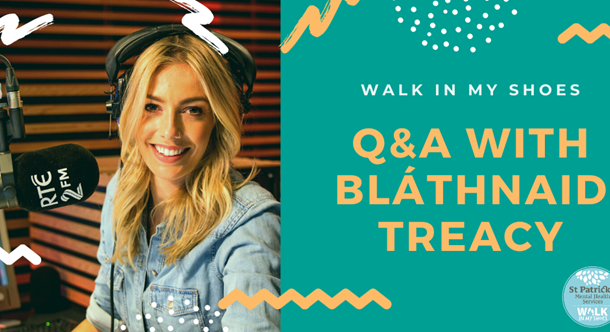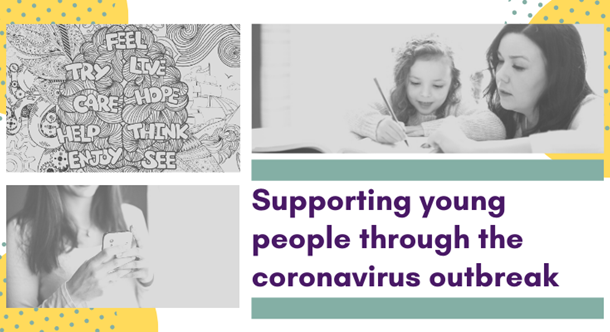
Keith Walsh chats with our Project Manager Amanda McArdle about managing your mental health, life during lockdown and the importance of routine.
Our Walk in My Shoes (WIMS) conversations to promote positive mental health, explore stigma and encourage wellbeing continues with some further special discussions.
As COVID-19 lockdown continues, we hope these conversations can help us all to get through these times together. We hope these chats about their mental health, challenges, and life experiences before during and after lockdown can help spark communication, openness and support.
Our latest guest is radio and television broadcaster, Keith Walsh. He currently presents on weekends from 5pm-7pm on RTÉ 2FM. Keith was previously the lead anchor on RTÉ 2FM’s early morning breakfast show, Breakfast Republic. Keith has also lent his talents to the small screen appearing in a variety of roles on RTÉ One, RTÉ Two and Virgin Media.
He chats with our Project Manager Amanda McArdle about managing your mental health, life during lockdown and the importance of routine.
Amanda: The last few months have been a challenging and strange time. How have you been finding it?
Keith: The lockdown, I think, could be a very difficult time for people; it highlights issues you might have personally, within your family or within your circle. Things that you've been putting on the back burner that you think “I’ll deal with that at some stage at a later date” ... I think it really brought those things out front and made us more aware of them.
I was lucky because, when I finished up working on the breakfast show on 2FM, I made the decision to start seeing a therapist, so the lockdown happened about a year after that.
I've done a lot of work on myself and my mental wellbeing. I enjoyed the break and enjoyed not having to be anywhere…. I enjoyed the fact that we were all stuck together, as it were. We were basically forced to hang out for a few months. I thought that was great.
For once, we were not doing anything, so it forces us to just live in the moment - just exist.
You recently made a powerful mental health appeal on the Brendan O'Connor Show on RTÉ Radio 1, telling listeners “we have time now to start thinking about who we are, and where we're at." Did you find that you had more time to think and reflect when the restrictions were in place? Is there anything new or positive you took from that time?
I could see my therapist who was still operating during lockdown. I could just check in with him on Zoom every week or two.
With therapy, you can do it every week for a while, and then you can stretch it out to every two weeks, once a month, whatever suits. The great thing about counsellors and therapists all over the country is that they were still available to people online.
But I found I started thinking about a morning routine, which involves journaling every morning and, basically; you get up in the morning, you write down all your thoughts and you get all your stuff out of your head onto a page.
My wife and I started exercising every day. All these things are important. I stopped drinking as well; you know, that was a huge plus for me - that I had a clear head… All these things add to your mental health and your mental wellbeing routine; getting a good night's sleep, not drinking, exercising... I think I came out of it with some strong daily routines, which I continue now, including meditation and just taking time out.
I can still have a bad day. But the thing now is, if I'm having a bad day, I'll say I just need to get through it. I'm not going to fall out with anybody, I'm not going to blame anybody. I'm not going to take it out on me… and I know that in the morning, I can get up and I can set about my routine. Bad days are okay. Sometimes I used to feel like, if I had a bad day, it would become a bad week. But now it's like every day is a new slate, start again.
Lots of people are talking about taking up new hobbies or skills since the restrictions began. Have you had the time to take up anything new?
One of the hobbies I took up was TikTok… During lockdown, there was a day that myself and my daughter Anna, who's 17 spent a few hours practicing a dance to put up on TikTok. There's no rhyme or reason to think that might happen in another world or another time, that a father and daughter spent a few hours learning a dance. You can be as cynical as you like, but that was just brilliant for me.
In recent months, you’ve put pen to paper and wrote a theatre play called ‘Pure Mental’. What is it about and what inspired you to write this?
Well, it started off when I started to go to therapy and my therapist recommended that I start writing as a way of dealing with traumas because we all have our traumas… it's important that we deal with them. So, by way of me dealing with my childhood and growing up, my therapist recommended that I write stories, so I joined the writing course here in Kildare and, at the end of the 10-week course, I ended up with about 10 short stories about my life and about stuff that was just totally made up as well.
We all have these stories in our heads - like we carry around these ghosts, people, incidents and traumas - and it was just about getting all that stuff down on paper and trying to make it sort of entertaining in some way.
So, I sent some of the stories to a friend of mine, Janet Morgan, who I'd studied with in college… We met and we went through the stories and we weeded out this, that and the other. It was basically my story and a universal story; it's a 40-something year old man who loses a job that he loves doing and how he deals with that.
We performed a “work in progress” online for people to watch and I think we had 4,000 people watch it in the end, which was massive. The Riverbank Theatre and Art Centre here in Newbridge helped us.
You speak very openly about the importance of taking care of your mental wellness, and in an IGTV video recently. you explained that just feeling “grand” isn’t good enough. When you announce these powerful messages, they get national attention. How does that feel?
I did one Instagram Live and I didn't really realise, I was kind of doing it for myself, as one of the big parts of therapy is to be vulnerable - to talk about it. Tell people that there are things you go to talk to a therapist about… it's just trying to normalise that and, if I have a platform, I'll try and use it.
The more I spoke about it, the more I noticed people are interested in it.
When the lockdown happened, I did a quick Instagram interview with Luke, my therapist, and I said to him, “what are the main things to look out for?”, and he said, ‘Keith, we just need to make sure that we get to the other side of this lockdown” … If I do it, and only two people watch it, and only one person goes to therapy, that’s enough for me… I enjoy sharing and I feel if people get something from it, that's great.
What message would you send to young people to help keep them motivated as we continue to live with some form of restriction and uncertainty during this time?
I did one Instagram Live and I didn't really realise, I was kind of doing it for myself, as one of the big parts of therapy is to be vulnerable - to talk about it. Tell people that there are things you go to talk to a therapist about… it's just trying to normalise that and, if I have a platform, I'll try and use it.
The more I spoke about it, the more I noticed people are interested in it. When the lockdown happened, I did a quick Instagram interview with Luke, my therapist, and I said to him, “what are the main things to look out for?”, and he said, ‘Keith, we just need to make sure that we get to the other side of this lockdown” … If I do it, and only two people watch it, and only one person goes to therapy, that’s enough for me… I enjoy sharing and I feel if people get something from it, that's great.What I would say to parents is, if your young person is in a funk and he’s always in his room and won't talk to you… remember to listen, and I mean really listen; sit down and listen to your children.
Don't try fix it; don't try and tell them what's wrong. Don't try and tell them what they're doing wrong. Listen to them. If they're in the room all day, and they're on the computer and you don't know what the hell's going on, don't have a go at them for being in there and tell them what they should be doing. Ask them what they're doing. Ask them who they're talking to, what game they're playing, who they're communicating with, what they talk about with those people; show an interest, listen to them.
For teenagers and young people to stay motivated, there's loads of things I could say, like make sure you're exercising regularly, make sure you're drinking enough water, and make sure there's lots of practical things you can do…
Keep in touch with your friends, whatever way you can, if it's via Tik Tok, if it's on your phone, even if it’s social media… Make sure it's not a bad place. Make sure that if there's stuff on there that you don't like, unfollow the things you don't like that make you angry. Tidy up your social media; put a bit of work into it, only follow the people that inspire you. Make it an inspirational place.
What’s the plan for the remainder of 2020?
Who knows? I have a plan A, a plan B, and Plan C, and I think I have a plan D, if I need it. who knows. I have a meeting on Friday with the Riverbank to finish off the play. I’ll continue the radio for the foreseeable, then I’ll be writing the rest of the play, so hopefully that'll be finished in September. And then, at the end of the year, if there isn’t another lockdown, we'll tour the country with the play, which is exciting. In the meantime, my plan B is to get myself set up with the equipment I need for a podcast. And then also we need to figure out a way, if there is a lockdown, that we can still do the play online.
Minding your mental health
Let's keep the conversation about managing your mental health going.
Continue to…
Teacher self-care during challenging times

